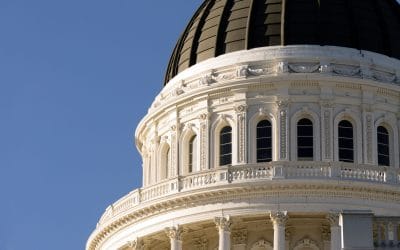Capitol Advisors Group has produced a series of comprehensive client briefs detailing new education laws that were passed by the Legislature and signed into law by Governor Brown in 2017. Each brief is organized by subject area and includes an executive summary highlighting major changes we think you should know about. Bills signed by the Governor take effect on January 1, 2018, unless the bill specifically states otherwise. A PDF version of this report is available here. Links to the previous eight updates are available below:
- Part 1 – Governance and Operations
- Part 2 – School Finance
- Part 3 – Curriculum and Instruction
- Part 4 – School Facilities
- Part 5 – Student Services
- Part 6 – Human Resources
- Part 7 – Assessment and Accountability
- Part 8 – Technology
Debate over firearm use continues. The ability to possess firearms on school campuses was further restricted this year. The Gun Free School Zones act of 1995 (Penal Code § 626.9(a)) generally prohibits the possession of a firearm in a school zone, except in very limited circumstances. SB 707 (Chapter 766, Statutes of 2015) authored by then-Senator Lois Wolk deleted some of the rare circumstances in which an individual could legally carry a firearm on school grounds. However, the bill did not address what many called a loophole in the law that allows superintendents of school districts, or their designees, to authorize individuals to carry firearms on school grounds. This year, Assembly Member Kevin McCarty (D-Sacramento), authored AB 424. The bill closes this loophole, deleting the provisions of current law which give school district superintendents the authority to authorize a person to carry a firearm in school zones. The bill faced a strict partisan vote nearly its entire journey through the Legislature, with Democrats supporting, and Republicans opposing the bill. Governor Brown signed AB 424, effectively removing the authority for superintendents, beginning January 1, 2018.
The Governor signed the following school safety bills this year:
Child Abuse
- AB 459 (Chau) – Public records: video or audio recordings: crime
Current law generally requires, under the California Public Records Act (CPRA), that a public agency must disclose a government record to the public, upon request, within 10 days of the request. This bill provides that a public agency is not required to disclose video or audio created during the commission or investigation of the crimes of rape, incest, sexual assault, domestic violence, or child abuse that depicts the face, intimate body part, or voice of a victim of the incident depicted in the recording. The bill, however, does require the agency to justify withholding such a recording by demonstrating that the public interest served by not disclosing the recording clearly outweighs the public interest served by disclosing the recording.
Chapter 291, Statutes of 2017 - AB 557 (Rubio) – CalWORKs: victims of abuse
This bill, starting on July 1, 2018, allows a California Work Opportunity and Responsibility to Kids (CalWORKs) applicant who provides a sworn statement attesting to past or present domestic abuse, and who is fleeing his or her abuser, to be deemed homeless and made eligible for CalWORKs temporary homeless assistance and further, requires such homeless assistance payments to be granted immediately. Additionally, the bill provides that a CalWORKs applicant or recipient being in a domestic violence situation that results in school non-participation or the failure to cooperate shall constitute good cause for school non-participation in the CalWORKs program.
Chapter 691, Statutes of 2017 - AB 597 (Stone, Mark) – Child abuse and neglect: information: computerized database system
Current law allows an individual county to establish a computerized database for the purposes of allowing agencies within that county that provide services to children and families (foster youth agencies, for example) to share identifying information regarding families at risk for child abuse or neglect. This bill permits Santa Clara County, Santa Cruz County, and San Mateo County to jointly establish a computer database to share information regarding families at risk for child abuse or neglect, and allows for this information to be used for research purposes intended to better serve those families and to prevent abuse and neglect.
Chapter 581, Statutes of 2017 - AB 953 (Baker) – Protective orders: personal information of minors
This bill provides protection to minors involved in cases considering wether or not to grant restraining orders. It allows a court to, after considering if the minor’s right to privacy overcomes the right of public access to the information, keep information about the minor (particularly the minor’s name, address, and circumstances surrounding the protective order with respect to the minor) in a private, confidential case file, rather than in the case’s public file.
Chapter 384, Statutes of 2017 - ACR 34 (Baker) – Child Abuse Prevention Month
This resolution acknowledges the month of April 2017 as Child Abuse Prevention Month.
Chapter 49, Statutes of 2017
School Safety
- AB 424 (McCarty) – Possession of a firearm in a school zone
This bill deletes the authority of a school district superintendent, his or her designee, or equivalent school authority to provide written permission for a person to possess a firearm within a school zone. The bill provides an exemption for the activities of a program involving shooting sports or activities that are sanctioned by a school, school district, college, university, or other governing body of the institution and the activities of a certified hunter education program.
Chapter 779, Statutes of 2017 - SB 756 (Stern) – Restitution: noneconomic losses: child sexual abuse
Current law requires that a restitution order for a defendant convicted of a crime to pay restitution to the victim must be of a dollar amount that is sufficient to fully reimburse the victim for every determined economic loss as a result of the defendant’s criminal conduct, including, but not limited to, noneconomic losses for psychological harm stemming from certain felony instances. This bill expands the required restitution order amount to include noneconomic losses for psychological harm stemming from felony incidents of repeated or recurring incidents of sexual abuse of a child under 14 years of age or from felony incidents of sexual contact with a child under 10 years of age.
Chapter 101, Statutes of 2017 - SR 31 (Mitchell) – Relative to sexual assault
This resolution resolves that the Senate recognizes the month of April 2017 as Sexual Assault Awareness Month and April 26, 2017, as Denim Day California, and encourages everyone to wear jeans on that day to help communicate the message that there is no excuse for, and never an invitation to commit, rape.
Adopted




0 Comments